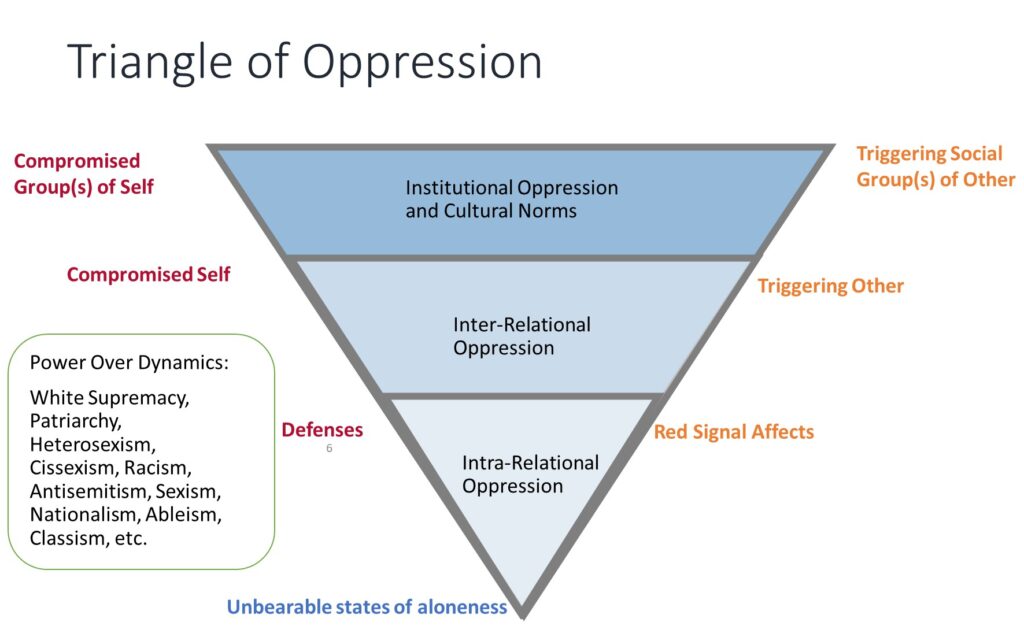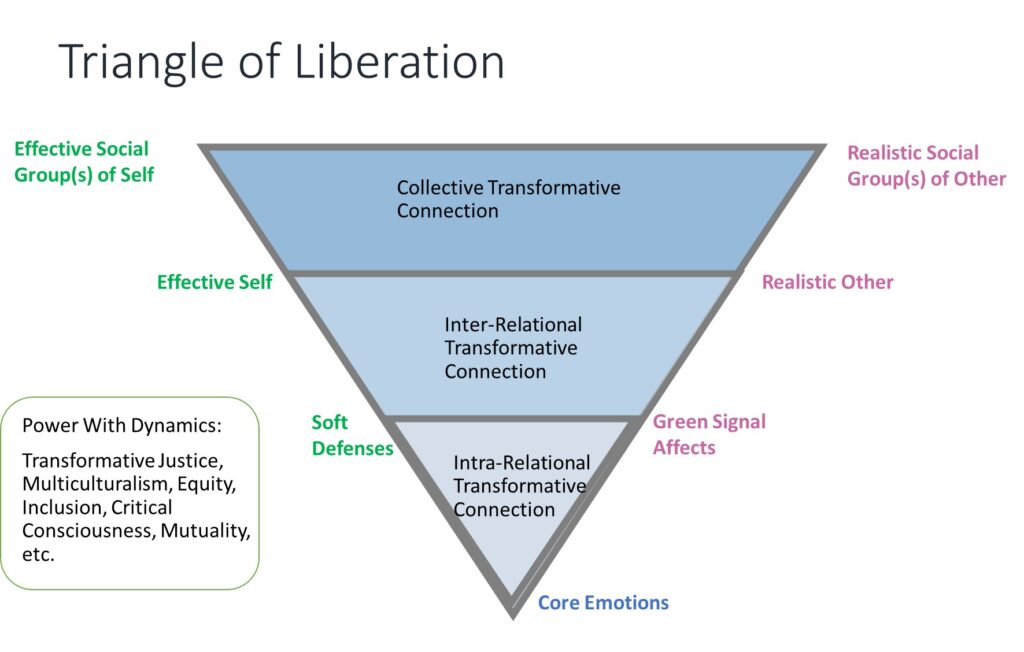“Real progress demands hard conversations. Real dialogue is messy, uncomfortable, unapologetic. And disagreement isn’t betrayal. Peace comes not from nodding in agreement, but from fighting through – and for – our hardest truths” – Ahmed Fouad Alkhatib
When Russia invaded Ukraine, I made a conscious choice to step back from the news. I remember that day in February 2022 vividly. Just as I was heading to work, my partner said, “It’s happening, there’s war.” I had a full day ahead, seeing seven clients, each grappling with their own emotional response to the war. I found myself asking each of them, “What have you done after receiving the news? How have you been resisting this violence today?” I framed resistance as the small, everyday acts we engage in to push back against violence, discrimination, and systems of oppression. Each client responded uniquely: making breakfast for their children to maintain a sense of normalcy, choosing a beautiful outfit to celebrate life, turning off the news to listen to music that connected them to our shared humanity, lighting a candle and offering a prayer, or openly allowing tears to flow. Each found their own form of resistance—offering comfort and strength.
From one war to another
At that time, it was easier for me to maintain emotional distance from the war, as I was less personally involved. I stayed away from the media, donated to humanitarian causes, and focused on my work, supporting my clients as they navigated their own fears and needs. But that changed after the horrific massacre of October 7th and the ongoing devastating war in Gaza. This conflict felt closer, more personal, and something I already was involved in before because of family. I found myself caught in the midst of polarization from day one. Where could I take my pain, grief, anger, and despair? I was and still am outraged that German politics and civil society fail to create a space where both Palestinians and Israelis, Muslims and Jews feel seen, heard, and safe. In Berlin, home to large Palestinian and Jewish Israeli communities, neither group feels adequately supported.
This failure deepens the polarization across our culture, media, schools, and public life, paving the way for dehumanization and isolation. The narrative became: if you’re for one, you’re against the other. Over the past year, I’ve witnessed relationships of all kinds breaking down—conversations cut off, people retreating into pain, despair, and shame, others lashing out in anger, or numbing themselves. The result is widespread polarization and disconnection. As a society, we’ve lost the ability to hold space for differing views and contradictions.
How do we speak our truth and how do we listen to the truth of others during times of war?
This is the challenge that Couples Therapy TV series therapist Orna Guralnik and her patient Christine explore in their conversation in The Guardian Opinion from September. It’s a dialogue between a Palestinian and a Jewish Israeli about war, occupation, apartheid, genocide, terror and the deep power imbalances. Their conversation models how the communication strategies we use in intimate relationships can also help navigate difficult conversations with those we perceive as “enemies.” It’s a powerful example of trust building through self- and co-regulation.
However, there’s a common misunderstanding about regulation. Many seem to believe that regulation means reaching a state where we no longer experience intense emotional responses, as though we can “fix” ourselves through enough healing or therapy. But regulation isn’t about avoiding intensity—it’s about creating enough inner security to take risks. It’s about staying grounded when everything inside us is shaking—whether from pain, anger, fear, or love. Regulation doesn’t always feel comfortable and a safe space is not necessarily a comfortable one. It’s the ability to hold multiple realities at once, remaining open to the world around us while staying connected to our own values and priorities, even when our hands are sweaty and our hearts are pounding.
This practice of holding space for complexity is not only vital for our connection to ourselves and in personal relationships but also for the relationships between our communities. Nonviolent activists often describe liberation as the process of letting go of hatred and violence within, in order to engage constructively with those considered “enemies.” This commitment stems not just from solidarity, but also from self-interest: our own liberation is bound up with the liberation of others, our own safety is bound up with the safety of others.
Empathy and Action: Building Accountability and Power
Emotional resonance alone is not enough. Empathy requires us to be accountable and build power. True empathy is both emotional and cognitive—it’s about understanding another’s perspective and responding appropriately. Similarly, self-compassion isn’t just about being kind to ourselves; it requires fierceness—the strength to set boundaries, stand up for our values, and take action in ways that align with true self-care.
In times of war, finding our voice and continuing to speak out when we can is crucial, especially when we have the resources and capacities to do so. We have a responsibility not to take sides, but to work toward solutions that uphold peace, nonviolence, and human rights. This means educating ourselves, listening deeply, and staying engaged—not to convince or even to agree, not to hold hands and become friends necessarily, but to hold on to our shared humanity and take steps toward a solution, one conversation at a time.
4 Practical Steps to Engage in Difficult Conversations
Whether it’s your best friend, partner, parent, or colleague, we all have relationships where disagreements run deep. Here’s how to approach these conversations constructively:
1. Choose your battle: Are you in the right place to have this conversation? Do you have the capacity to engage? Prioritize self-care, and remember—you don’t have to fight every battle.
2. Set yourself up to listen: Even if you disagree profoundly, focus on listening. While listening, use your body to stay open and grounded: breathe, relax into your chair, feel your feet on the floor, and let your triggers flow through you (=notice sensations and let them move through your body as you breathe).
3. Find common ground: Try to understand where the other person is coming from and identify at least one small thing you can agree with and state it. Building trust starts with connection.
4. Share your perspective: Once trust is established, clearly express what’s important to you. Stay respectful and polite. Remember, it’s not about changing the other person; it’s about speaking your truth.
If the conversation becomes triggering again, revisit Step 1. And remember, it’s always okay to end the conversation if needed—protect yourself, and remain polite, even in disagreement.
Hanging in there
Having difficult conversations is hard, and it’s important to remember that these exchanges are part of a larger journey toward understanding and healing. Every conversation, whether it ends in agreement or not, is an opportunity to practice empathy, maintain connection, and stay grounded in our shared humanity. In times of war and division, the simple act of keeping the dialogue open is a form of resistance to violence and polarization. Those conversations can also be part of practicing hope as a skill. Sometimes we listen and hear someone say the words that we have been looking for, sometimes we speak and others might hear the words they haven’t found yet. Even when conversations feel incomplete, they are steps toward a future where mutual respect and peace are possible. Keep listening, keep speaking up, and keep working toward a world where every voice is heard and valued!
Sources and Resources:
- ‘Many people would throw a tantrum at this point’: An Israeli and a Palestinian discuss 7 October, Gaza – and the future, The Guardian Opinion, September 13th 2024
- Couples Therapy TV Series
- Jouanna Hassoun, Shai Hoffmann, Trialog. Über Israel Palästina Sprechen, 2024
- Allan Wade, Small acts of living. Everyday resistance to violence and other form of oppressions, 1997
- Paul Linden, Embodied peacemaking – Body Awareness, Self-Regulation and Conflict Resolution
- Pooja Lakshmin, Real Self-Care. A Transformative Programme for Redefining Wellness, 2024
- Dr. Ahmad Abu Akel on Empathy, B8 of Hope Podcast, S1 Episode 9, 9.11.2024
- Kristin Neff, Fierce Self-Compassion. How Women Can Harness Kindness to Speak Up, Claim Their Power, and Thrive, 2021
- Pooja Lakshmin, Hope Is Not a Thing to Have – It’s a Skill to Practice, Oprah Daily 2022
The clear message from all of the following initiatives is this: an immediate ceasefire, a hostage/prisoner deal, an end to the occupation, and a diplomatic agreement that ensures safety and liberation for all on the land. With political leadership on all sides falling short, it is up to civil society voices to step up and advocate for peace, nonviolence, social justice and human rights for everyone. Initiatives like Combatants for Peace, Parent Circle, Standing Together, Women of the sun/Women wage peace, and Unapologetic: The Third Narrative have been keeping the conversation alive and working toward a solution for decades. It’s time for all of us to support those voices and initiatives and to join them in the work of healing and rebuilding.
In addition you can find here some initiatives and individuals actively working to counter the ongoing polarization in German politics, media, culture, and civil society, while also addressing anti-Muslim racism and antisemitism (Meron Mendel & Saba-Nur Cheema, Burak Yilmaz & Aylin Celik & Abdul Chahin). Those resources are mainly in German. For more resources from pro-solution advocates (including articles, podcasts, videos, books, and initiatives) in English and German language, visit: friendsofst.de.
From Pain to Liberation: overcoming internalized oppression
The Triangle of Oppression and the Triangle of Liberation, as formulated by AEDP therapist Ben Medley, offer a framework for understanding societal transformation.
The Triangle of Oppression outlines three forces that sustain oppression: dehumanization, disempowerment, and disconnection. These forces create a cycle that maintains inequality, injustice, and suffering in our societies.

In contrast, the Triangle of Liberation emphasizes the elements necessary for positive change: humanization, empowerment, and connection. To transform oppression, we need to see the humanity in others, empower individuals and communities, and foster deep, authentic connections. By addressing these three pillars, we can move toward a more just, inclusive, and compassionate society, making real transformation possible.

Ben Medley’s framework guides therapists in fostering both personal and societal change. By helping clients reconnect with their humanity, reclaim their power, and build meaningful connections, therapists can counter the effects of oppression. This approach promotes individual healing and contributes to broader societal transformation.
If you want to learn more about the Change Triangle on an individual, intra-relational level, read our post on How to Understand and Navigate Your Emotions or visit our course SOS Emotions – Self-regulation with the Change Triangle.
